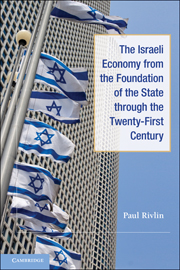Book contents
- Frontmatter
- Contents
- Figures
- Tables
- Appendices
- Preface
- The Israeli Economy from the Foundation of the State through the 21st Century
- One Introduction
- Two The Economy of the Yishuv and Its Legacy
- Three The Economy, 1948–1985
- Four Macro-Economic Developments, Growth, and Policy
- Five Globalization and High Technology
- Six Defense: Service or Burden?
- Seven Israel and the Palestinians
- Eight The Economics of Religion
- Nine The Arab Minority
- Ten Demographic Developments and Socioeconomic Divisions
- Eleven Conclusions
- Appendices
- References
- Index
Eight - The Economics of Religion
Published online by Cambridge University Press: 05 June 2012
- Frontmatter
- Contents
- Figures
- Tables
- Appendices
- Preface
- The Israeli Economy from the Foundation of the State through the 21st Century
- One Introduction
- Two The Economy of the Yishuv and Its Legacy
- Three The Economy, 1948–1985
- Four Macro-Economic Developments, Growth, and Policy
- Five Globalization and High Technology
- Six Defense: Service or Burden?
- Seven Israel and the Palestinians
- Eight The Economics of Religion
- Nine The Arab Minority
- Ten Demographic Developments and Socioeconomic Divisions
- Eleven Conclusions
- Appendices
- References
- Index
Summary
Religion plays an unusual and large role in the Israeli economy. This is mainly because of the ultra-orthodox Jewish community (known in Hebrew as Haredi, or fearful of God) that numbers about 600,000, or about 8 percent of the population. There are a range of estimates of the size of the ultra-orthodox community depending on the measures used. Its population is heavily concentrated in Jerusalem and Bnei Brak, near Tel Aviv, and is spreading to other towns, especially in the West Bank. As a result of its religious beliefs and the political power it has accumulated, the ultra-orthodox community has been able to limit its interaction with the rest of society while obtaining large economic benefits from it. As a result, it has been able to maintain a way of life that limits participation in the labor force, reduce the amount of secular learning (mathematics, science, humanities, civics, and English) in its schools, and avoid army service. It also has a high birth rate resulting in large families and rapid growth of its population, largely made possible by government assistance. These factors impose heavy costs on the economy that are almost unique to Israel. To understand the economics of religion in Israel, it is essential to understand the politics of religion. This is examined here and in Chapter 11. This chapter concludes with an analysis of the allocation of public funds for religious services that are, in theory, available to the whole community. It will show how these have been largely captured by a section of the population that monopolizes their use.
The Ultra-orthodox
Ultra-orthodox, or Haredi, is the most theologically conservative form of Judaism. Haredi is derived from the Hebrew word meaning fear or anxiety, and is interpreted in the biblical context as “one who trembles in awe of God.” Ultra-orthodox Judaism is highly ritualistic and attempts to preserve the lifestyle – including the clothing – of the Eastern European village of hundreds of years ago.
- Type
- Chapter
- Information
- Publisher: Cambridge University PressPrint publication year: 2010



